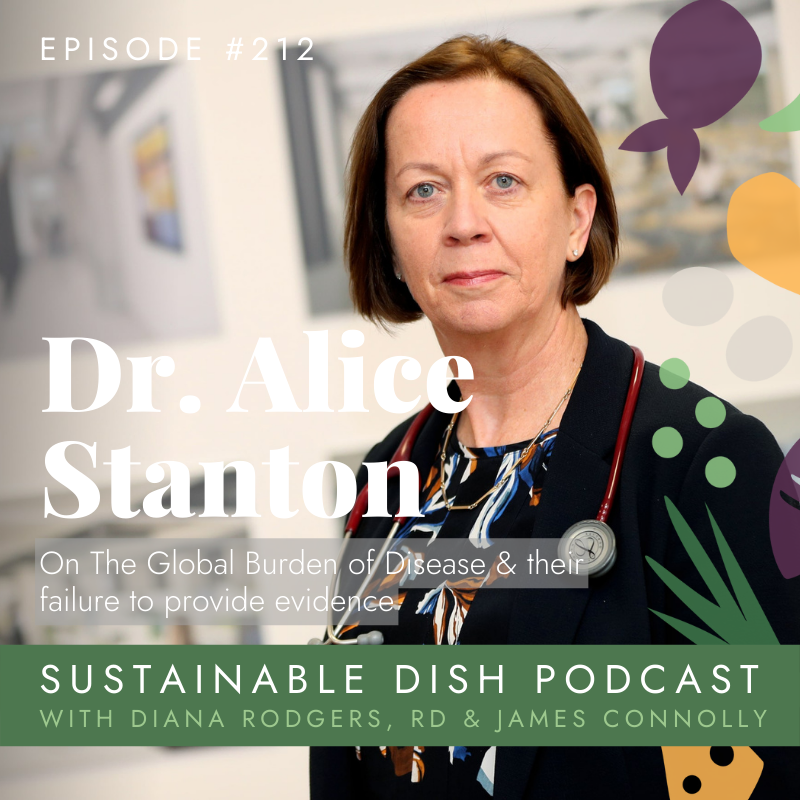Podcast (sustainable-dish-podcast): Play in new window | Download
If you’ve been following me for long, then you know the most recent publication of the Global Burden of Disease Risk Factor Study (GBD) in 2019 came to some startling conclusions about the impact of red meat on health.
But if you’re new – here’s a quick recap:
The GBD study is a comprehensive analysis of epidemiological studies that look at factors that increase risk for death, illness, and injury worldwide. The results of the study influence health policy worldwide.
The most recent report, released in The Lancet in October 2020, revealed a 36-fold increase in deaths caused by red meat and concluded the Theoretical Minimum Risk Exposure Level of red meat is 0g per day (meaning even one bite of beef ups your risk of death!).
These shocking conclusions caught the eye of a group of highly respected global academics who wrote a letter to The Lancet requesting evidence backing up these results. Until very recently, this request was largely ignored.
One member of this group of academics is Dr. Alice Stanton, and she is on the show today to give us an update on the progress made on the questions asked of the GBD authors.
Dr. Stanton is a clinician-scientist with a PhD in Pharmacology. She is currently a Fellow of the Royal Colleges of Physicians and a Professor of Cardiovascular Therapeutics.
In this episode, Dr. Stanton discusses:
- Her concerns over the focus of nutrition messaging demonizing red meat and other animal-sourced foods
- Omission of most ultra-processed foods in the GBD
- The influence of the GBD on worldwide food and nutrition policy
- The difference between GBD 2017 and GBD 2019
- Standards for scientific publications
- GBD authors’ admission of errors
- Where do we go from here?
As you listen, follow along with the slides below or join my Patreon to see the full video presentation while supporting my work.
Slides:
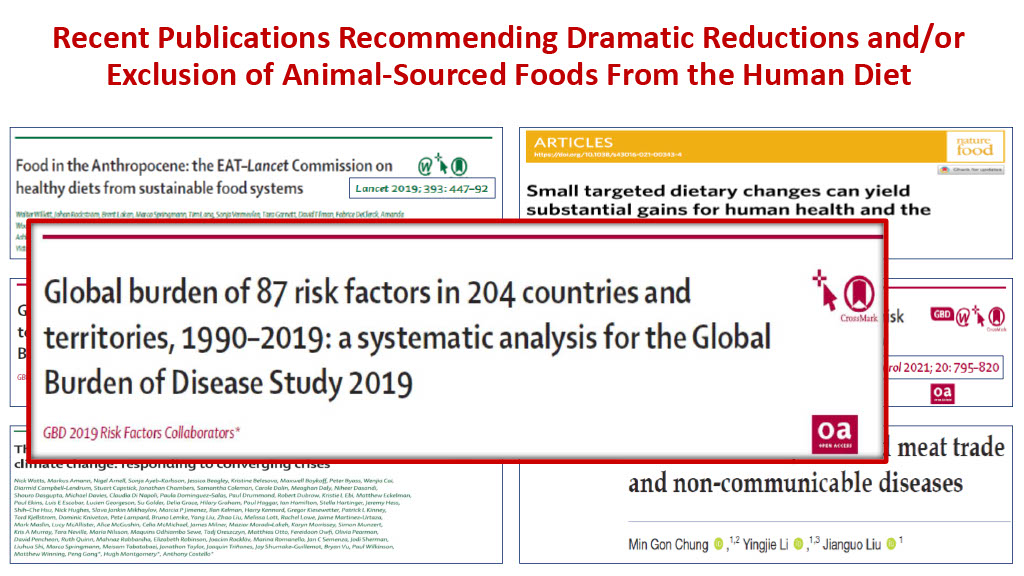
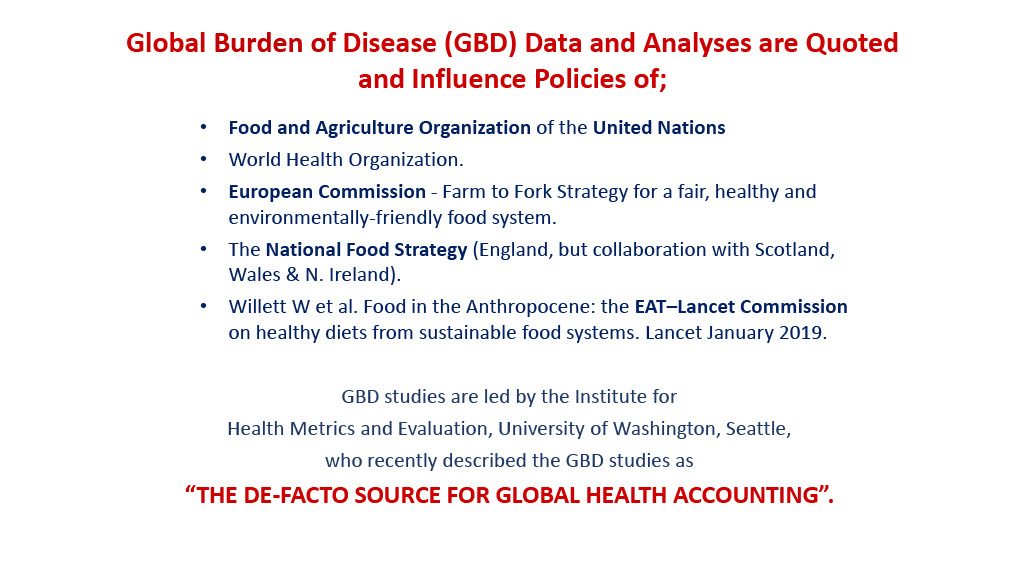
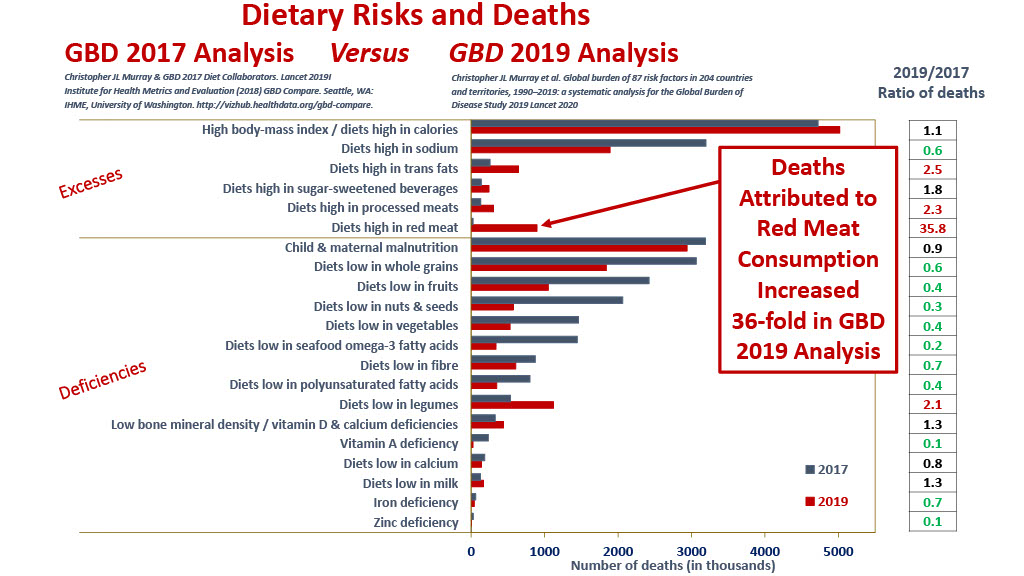
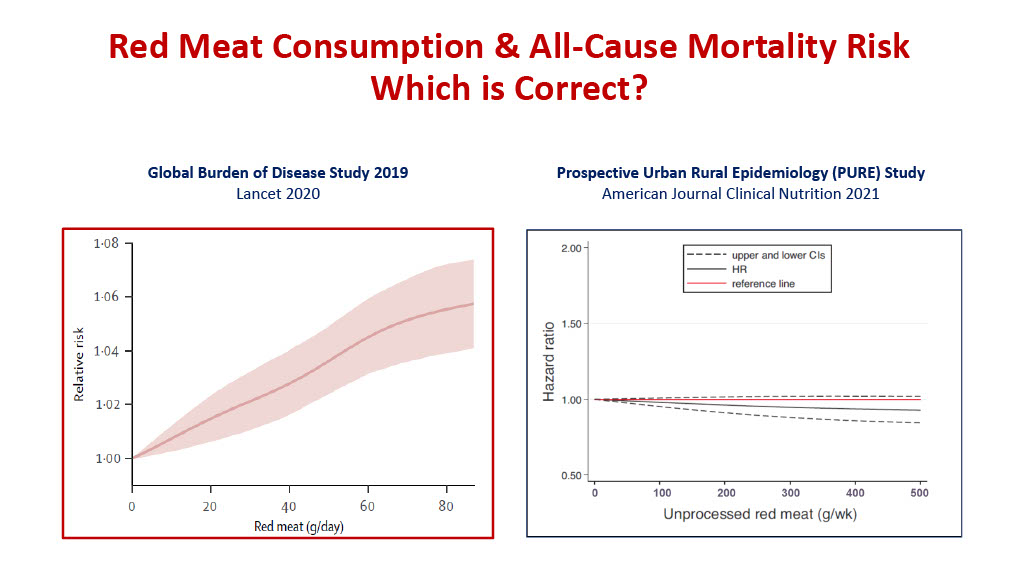
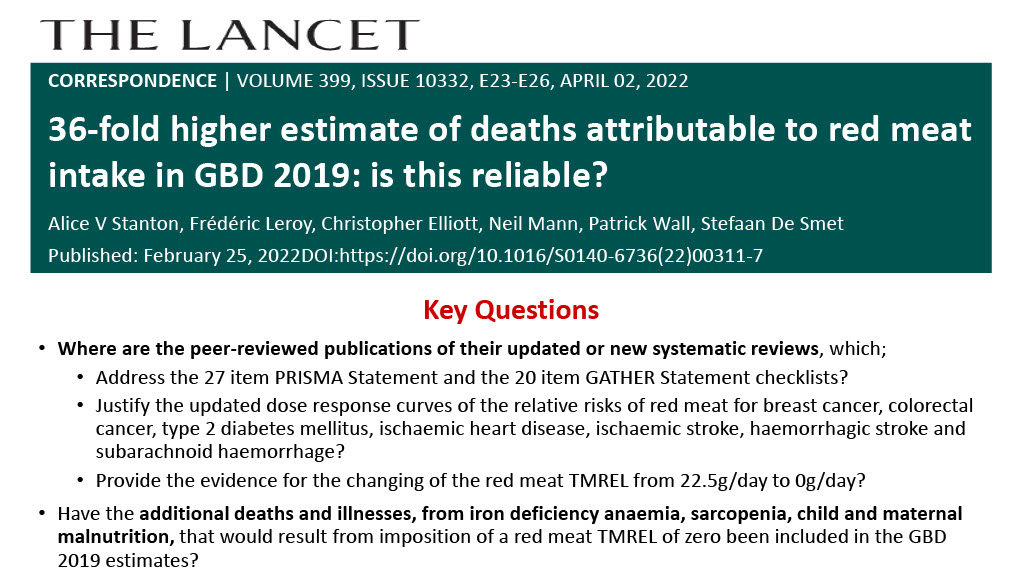
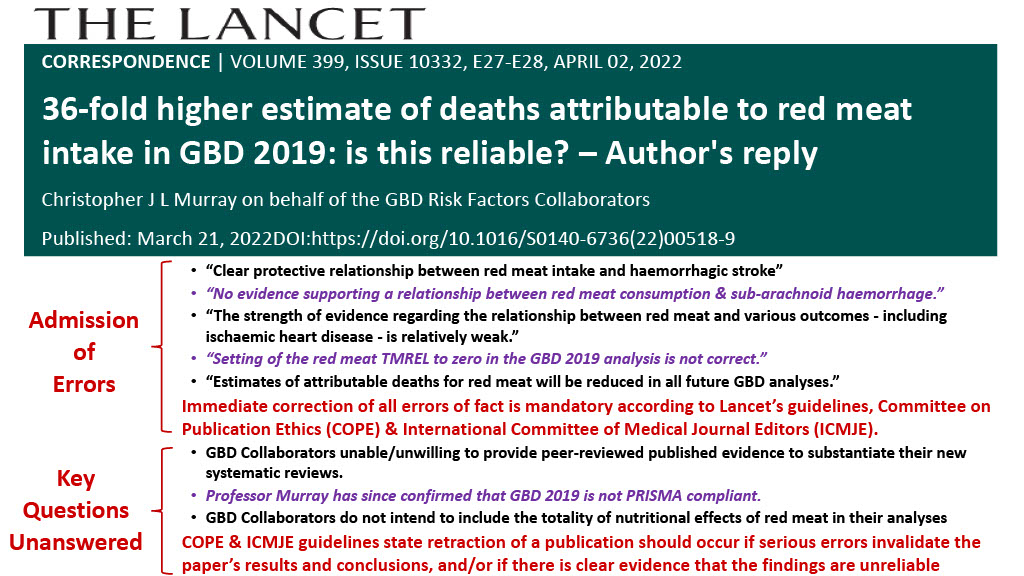
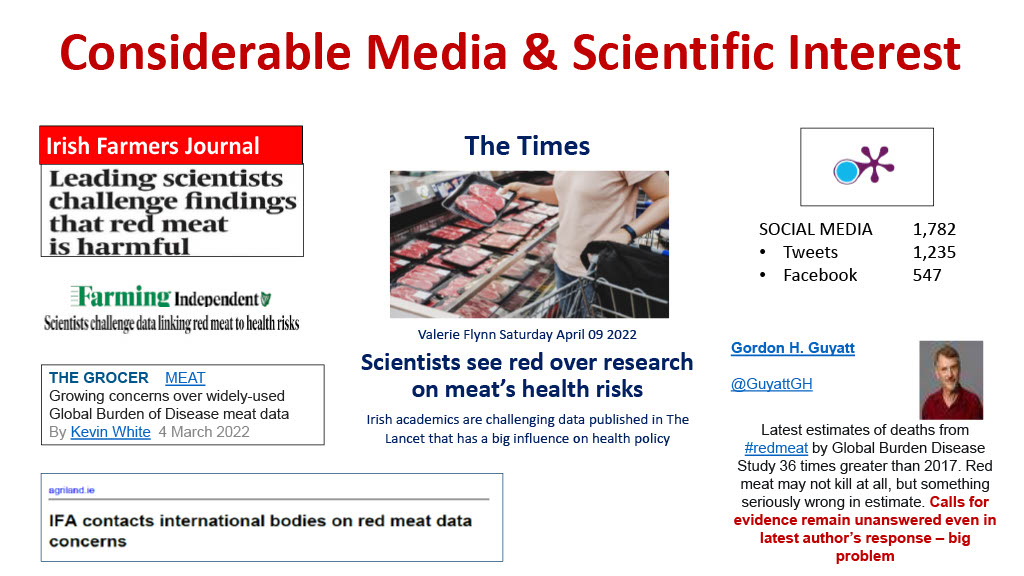
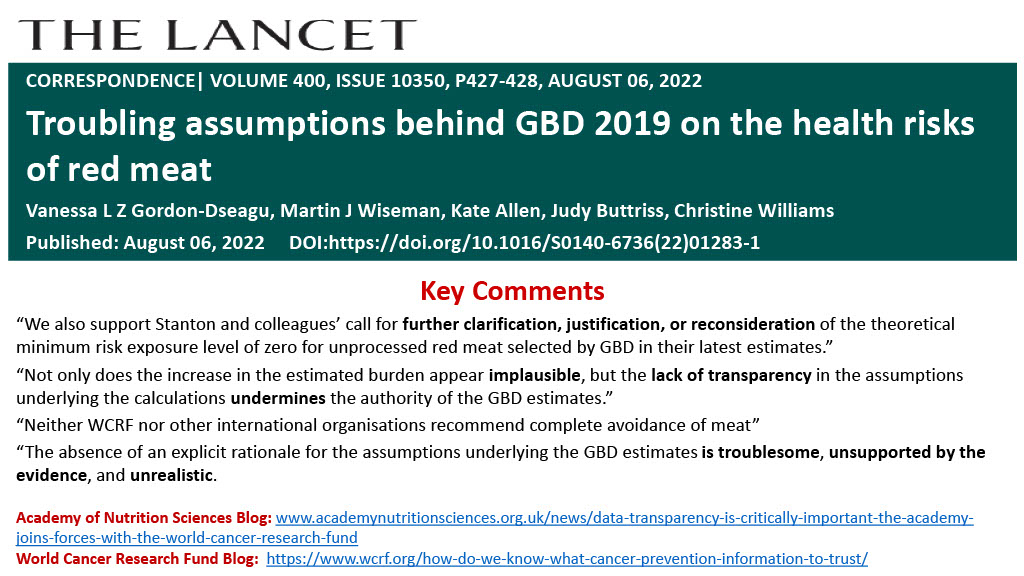
Resources:
The Lancet: A Systematic Analysis of the Global Burden of Disease Study 2019
Connect with Dr. Stanton:
Website: Dr. Alice Stanton
LinkedIn: Dr. Alice Stanton
Episode Credits:
Thank you to all who’ve made this show possible. Our hosts are Diana Rodgers and James Connelly. Our producer is Emily Soape. And, of course, we are grateful for our sponsors, Patreon supporters, and listeners.
It’s officially Sustainavore September! We’re launching the biggest Sustainavore community yet, and I’d love for you to be a part of it. If you’re ready to reclaim your best health, recover from chronic health issues and learn how real food, grown in a sustainable way can heal your body and the planet, join us at sustainavore.com.
You’ll get instant access to the entire course with tons of extra bonus material all in easy-to-follow modules. Plus, interact with me and a huge community of people just like you. Sign up now at sustainavore.com.
And if you’re ready to take your support for a nutritious, sustainable, and equitable food system to the next level, join my Global Food Justice Alliance community on Patreon. You will have access to ad-free podcasts, exclusive videos, a discussion community, and much more. Go to sustainabledish.com/join to support my work.
Quotes:
“Iron deficiency in the western world in high-income countries, the average prevalence of iron deficiency anemia is around 20% in many of those countries.” – Dr. Alice Stanton
“Which would you believe: modeled data with no evidence or actual real data where all the details are provided and published in the American Journal of Clinical Nutrition in 2021?” – Dr. Alice Stanton
“If these refusals persist, well, then The Lancet should retract the Global Burden of Disease 2019 Risk Factors paper.” – Dr. Alice Stanton
Transcript:
Diana Rodgers, RD
Welcome to the Sustainable Dish Podcast. I’m Diana Rodgers, a real food registered dietitian, author, and sustainability advocate. I co-host this podcast with James Connelly, who was a producer on my film Sacred Cow. I also founded the Global Food Justice Alliance, an initiative advocating for the inclusion of animal source foods like meat, dairy, and eggs for a more nutritious, sustainable, and equitable worldwide food system. You can check it out and join me at global food justice.org. Thanks again for listening. And now on to our show.
(Sustainavore Ad) Diana Rodgers, RD
I’m excited to announce that September is now officially renamed Sustainavore September! We’re launching the biggest Sustainavore community yet, and I’d love for you to be a part of it. If you’re ready to reclaim your best health, recover from chronic health issues and learn how real food, grown in a sustainable way can heal your body and the planet, head over to sustainavore.com and sign up now. You’ll get instant access to the entire course, tons of extra bonus material, and to my years of experience as a dietitian condensed into easy-to-follow modules. Plus, interact with me and a huge community of people just like you. I hope to see you at sustainavore.com.
Diana Rodgers, RD
Welcome back to the podcast, everyone. I’m really excited to have Dr. Alice Stanton here with me from Ireland. And we’re going to be talking a little bit about what is the Global Burden of Disease, she has been working with a few other people on really pushing back against the 2019 study that was published in The Lancet, which I’ve mentioned a few times. But I really wanted to have Alice on here to explain what the study is, why it’s so important, what the flaws were, and what she and her group are asking The Lancet to do. So welcome, Alice.
Dr. Alice Stanton
Thank you very much, Diana. Delighted to be with you today.
Diana Rodgers, RD
Well, before we get into all of this, will you give people a little bit more information on your background, how you got into what you’re doing and what your current kind of full-time role is?
Dr. Alice Stanton
Yeah, well, I’ve a sort of diverse background. I’m an academic clinician. So, I’m a Professor of Clinical Pharmacology with the Royal College of Surgeons in Ireland. And I’m – so involved in research, mainly cardiovascular research, both with drugs, and with lifestyle measures, preventive medicine, also teaching. And I’ve been in clinical practice for the past 30 years, and mainly working in hypertension and high cholesterol, preventing heart attacks and strokes, again, with drugs and with lifestyle measures. But for the last 10 years, I’ve increasingly got interested in diet. First of all, the detrimental effects of excessive salt, and then the value of nutrient-rich foods, such as omega-three polyunsaturated fatty acid in rich foods, and indeed, been involved in an innovation whereby you can get your DHA polyunsaturated fatty acids, via enrich chicken, meat and eggs, rather than oily fish. So, an additional source for omega-three polyunsaturated fatty acids. And then over the last couple of years, I was hearing increasing comments such as well, we all know, red meat is bad for us. And so was dairy. And I said, “Well, you know, actually, we don’t – where’s the evidence?” So, increasingly, I’ve been involved in this discussion. And it involves the impact of food on human health or also on the environment. And some of the reasons, and that’s understandable, people are concerned about livestock farming and its impact on the environment. But what I’m concerned about is the kind of knee-jerk reaction will actually livestock farming is damaging to the environment, particularly climate change. So therefore, let’s get rid of it without thinking of what would the overall impact be on human life, and in particular, on the most vulnerable, so children, women, and the elderly, if we got rid of such nutrient-rich foods without adequate replacements. So I’ve been got very involved. And each time what I’m asking for is, what’s the evidence? And how do we best achieve a balanced solution? So yes, get rid of the excesses of all foods, anything that you’re eating to excess, particularly actually ultra-processed foods. And can we increase or improve production agriculture, so that actually it benefits the environment rather than damage it? So arrive at a solution, a balanced solution to this issue, which affects our whole food system.
Diana Rodgers, RD
And it’s so interesting to me that meat has become such a focus of this discussion, especially when we look at the excess calories in the diet. People don’t understand meat is such a relatively low-calorie food compared to the, you know, 60% of what’s making up most western diets, which is ultra-processed nutrient-poor foods. But I’m not hearing from mainstream dietitians or any government officials that we need to be looking at cutting down on our intake of those nutrient-poor, high-calorie foods. It’s always just focused on meat.
Dr. Alice Stanton
You know, I think there are some very balanced nutritionists and government bodies and physicians that are expressing huge concern about ultra-processed foods, and are absolutely saying that we should be eating whole foods, both whole plant-sourced and animal-source foods. But actually, we’re going to be talking in more detail about the Global Burden of Disease who say that they actually are looking at all risk factors for illness. But it’s amazing to me that in all their nutrition risk factors, and 60% of the diet in the Western world, particularly in Europe and North America, is taken up with ultra-processed foods that actually doesn’t deserve a mention the only processed foods that getting mentioned in the Global Burden of Disease analysis is processed meats, and sugar-sweetened beverages. This is a major omission. Ultra-processed foods are definitely contributing to obesity, which is one of the major nutritional risk factors for chronic illnesses, such as heart attacks, strokes and cancers, doesn’t even get a mention.
Diana Rodgers, RD
Yes, and they’re taking the place have more nutrient-dense foods, which can not only make someone healthier, but also prevent a lot of the nutrient deficiencies, like iron deficiency, which is so common in countries where many people don’t think that we actually have nutrient deficiencies.
Dr. Alice Stanton
Yeah, iron deficiency in the western world in high-income countries, particularly women with knock-on implications for their babies, the average prevalence of iron deficiency anemia is around 20% in many of those countries. That means that the in utero, the babies, in particular, their brains will be less well developed. And if they’re breastfeeding, knock-on implications for the first year or two of life, it is a major concern. And it is women, young women in particular that are listening to the social media message, that exclusion of animal source foods is good for you and good for the planet – which is too simplistic message.
Diana Rodgers, RD
Exactly, exactly. So you have some slides to share with us. And before we do that, will you talk a little bit about what this Global Burden of Disease risk factor study is, who The Lancet is that publishes it and just to give us a little background on how important this paper really is.
Dr. Alice Stanton
Yes, and in fact, I’ve included that in a total of nine slides, because I think it is important to give the background and I’m going to share my screen at the moment. And I think some of you will view the video and some of you will view the audio with the slides alongside so I hope you’ll be able to follow it. Yeah, so I’ll share my slides or share my screen now. So give me one sec.
Diana Rodgers, RD
And so for those of you who are just listening to the audio through the podcast, we will be posting these slides on my blog on the website Sustainable Dish so you can see the slides. And then for those Patreon subscribers of mine who are donating monthly to the Global Food Justice Alliance, you will actually get to watch this whole video ad free, so take it away, Alice.
Dr. Alice Stanton
Well, what I’ve… what I’m showing on the screen is six titles of major publications that in the last couple of years have recommended either dramatic reductions, or actual exclusion of animal source foods from the human diet, in particular, focusing on reduction or exclusion of meat, and in particular, reduction or exclusion of red meat. And I’m not going to go through all of them. I mentioned one of the first was actually the Eat Lancet Commission on Healthy Diets which recommended a 90% reduction in red meat intake, certainly in high-income countries. But I’m going to focus in on the second one which is the global burden of 87 risk factors in 204 countries and territories at the 2019 analysis, it’s a Global Burden of Disease Study 2019, published in The Lancet in 2020, I think in October of 2020, so almost two years ago. And the reason I’m going to focus on this study is because all of the other studies either use the data of the Global Burden of Disease study, or they use their analytical approach, and basically copy what the Global Burden of Disease study does, and take its concepts. Now, Global Burden of Disease, it’s the second reason for focusing in on this Global Burden of Disease Risk Factors 2019 analysis is the global burden of disease or GBD studies are hugely influential. So they’ve been quoted and influence the policies of the Food and Agriculture Organization of the United Nations, the World Health Organization, the European Commission. They were quoted in the Farm to Fork strategy really important for the future of food production and food consumption in the EU, the National Food strategy, which is for England, but also has major influence on Scotland, Wales and Northern Ireland. And indeed, an actual fact in the Eat Lancet Commission paper, they used Global Burden of Disease 2017 data. Now, the global burden of disease studies have multiple investigators worldwide. But they’re led by the Institute of Health Metrics and Evaluation, which is an institute in the University of Washington in Seattle. And they are aware of how influential and how impactful their studies are. In fact, they recently described themselves as being the de facto source for global health accounting in the world. In particular, their risk factors studies are very influential. And they’re published always in The Lancet approximately every two years. So we are expecting another version to be produced within the next couple of months, which might be termed the Global Burden of Disease Risk Factors 2021 analysis, which will take over from the 2019 analysis, but at the moment is the 2019 analysis that is influencing all of these bodies listed in the slide here. Now, the next slide is a bit complicated, but what I’ve shown is the Global Burden of Disease 2017 analysis in blue columns, and the 2019 analysis in red columns for all dietary risk factors, and for the number of deaths that they caused annually, worldwide, because of either excesses or deficiencies. Now the big excesses are high body, body mass index, or diets high in calories, leading to overweight and obesity, causing almost four and a half million deaths worldwide and both 2017 and 2019. And another major excess are diets high in sodium or salt in the 2017 analysis that was causing over 3 million deaths reduced by 40% without explanation in the 2017 analysis, and I am concerned about that salt continues excess salt continues to be a major cause of hypertension leading on to strokes and heart attacks and indeed some cancers. I cannot understand why this is now regarded as less impactful.
Diana Rodgers, RD
Oh, sorry, I just want to interrupt just one second there only because I do want… one of the sponsors of my work is an electrolyte company that you know, you can add sodium plus potassium, magnesium to your water and so I may get some pushback on that one and I just want to address that. I’m in agreement with you that diets high in sodium, meaning diets high in ultra-processed foods so when someone is eating a diet that is largely whole foods, fresh foods, fresh fruits, and vegetables, adding some electrolytes to your water is not something that’s going to be a major concern for a doctor like you. It’s really these ultra-processed diets that ready meals and things like that which are ridiculously high in sodium and also are never balanced with the other potassium and magnesium. Those definitely do cause concern.
Dr. Alice Stanton
Yeah. No, it’s diets very high in salt and in large part that comes from processed and ultra-processed foods. The big deficiencies are child and maternal malnutrition, and indeed, animal source foods; meat, milk, eggs, and fish are really protective not only about providing high-quality protein, but also many minerals, such as iron, and zinc, selenium, and also many vitamins such as vitamin D and B12, et cetera. And then alongside that, diets that are low in whole plant foods, so diets low in whole grains diet, low in fruits and nuts, seeds, vegetables, omega three fatty acids, very important. So absolutely no argument with that. What I’m exceedingly concerned about is in the 2019 analysis, diets excessive in red meat are now reported to cause almost 900,000 deaths. Whereas in the 2017 analysis, they were only causing 25,000 deaths worldwide. So this is a 36-fold increase in the number of deaths attributed to diets excessive in red meat consumption.
Diana Rodgers, RD
But am I correct in that they refer to any red meat as high in red meat? So any level of meat at all in someone’s diet is considered a diet high in red meat?
Dr. Alice Stanton
When you delve into the analysis, they use a term called the TMREL. It’s the theoretical minimum-risk exposure level. And really, you can take that as the optimal intake. And previously, they had regarded that as 22.5 grams per day, which will add up to about 170 grams per week and would allow you two portions of red meat a week, I really didn’t have much evidence for that. The evidence really is that two to four portions of red meat looks about optimal in terms and certainly no added risk for chronic disease. But we could accept around 170 grams of red meat per week, they reduced it to zero. So they’re now saying the first mouthful of red meat is causing deaths and illnesses, from heart attacks from strokes from diabetes mellitus, from colon cancer, from breast cancer, and without any explanation whatsoever or providing any evidence for this change in the TMREL, or for the new endpoints, which are stroke, heart attacks and breast cancer in addition to colon cancer and diabetes mellitus, which they had previously counted as being a problem with very excessive red meat consumption. So we were concerned and in fact, this slide, the next slide actually elaborates on what the Global Burden of Disease study are actually saying. So plotted on the horizontal axis in the left panel is red meat intake in terms of grams per day, and relative risk of death. All-cause mortality is plotted on the vertical axis. And the pink line indicates the relationship, and the paler pink indicates the 95% confidence intervals. So really, from the first mouthful from 10 grams of red meat per day, there’s an increase in deaths. And it’s just really significant because the 95% confidence intervals don’t include one. And that continues to rise up to 80 grams of red meat per day. And in fact, the worldwide consumption of red meat is something like the median is around 30 grams of red meat per day, and very few people consume more than 75 or 80 grams of red meat per day. This is what Global Burden of Disease 2019 says is the relationship with death with red meat that increases from the first mouthful. This is data from one of the most recent large prospective studies, the prospective urban, rural epidemiology study led by McMaster University in Canada, and they said that the relationship and they found from actually studying deaths and counting up the number of deaths in a very large population from 21 countries, low income, medium income, high-income countries, and they find if anything, there was a protective relationship or a trend towards protection with increasing consumption of unprocessed red meat intake They plotted against grams per week. So 500 grams per week is about equivalent to 70 grams per day. And they found a protective or a trend towards protection rather than an increase in risk. Which is correct? Which would you believe? Modeled data with no evidence? Or actual real data where all the details are provided and published in the American Journal of Clinical Nutrition in 2021?
Diana Rodgers, RD
I just wanted to ask one more time about these population studies, too, though, aren’t they? I mean, are they really adjusting for income? And I mean, we know people who have higher income, probably can afford more red meat and therefore have but also maybe have more access to health care and less stressful jobs and things like that. I mean, are those things being accounted for in the PURE study?
Dr. Alice Stanton
It certainly – the PURE study was very well conducted, and it was stratified or adjusted for country income plus individual income, plus, also, energy intake, fruit and vegetable intake, education level. All of the major risk factors were adjusted for and accounted for in the prospective urban, rural epidemiology study. Yeah, it is a huge concern that, yeah, excessive red meat consumption quite often is accompanied by other lifestyle factors, which are not advantageous. In particular, cigarette smoking seems to travel with excessive red meat consumption, and there is an absolute need to adjust for it. And it is difficult to fully adjust. And that is why that any of the other show studies that have shown a relationship with very large amounts of red meat consumption. There has been a concern that they haven’t been fully adjusted. The PURE study was very well conducted and addressed that issue.
Diana Rodgers, RD
Thank you.
(Patreon Ad) Diana Rodgers, RD
Ready to take your support for a nutritious, sustainable, and equitable food system to the next level? Join my Global Food Justice Alliance community on Patreon and have access to ad-free podcasts, exclusive videos, and a discussion community, plus so much more. Go to sustainable dish.com/join to support my work, and thank you.
Dr. Alice Stanton
Because of our concern between the disparity between the Global Burden of Disease 2019 analysis, and what we could see in the literature, six of us all professors at six different universities in Ireland, in the UK, in Australia, and in Belgium got together. And we wrote a letter to The Lancet, which is what you do when you have a query about the scientific basis of something that’s published in The Lancet. And we asked two key questions. We said, “Where’s the evidence? Where’s the peer-reviewed publications describing the updated and new systematic reviews of a relationship between red meat and, say breast cancer, colon cancer, heart attacks, various types of strokes.” And if you’re doing new or updated systematic reviews, well, then you have to provide a lot of information to address the PRISMA statement – so 27 particular details. And also if you’re reporting on global health metrics, you have to answer 20 items of the GATHER statement checklist. And this is required by all top journals, and in fact, as the mandatory requirements of The Lancet. So we wanted the updated dose-response curves for all of these adverse outcomes the Global Burden of Disease 2019 was claiming were happening because of excessive red meat consumption. And we wanted the evidence for changing the red meat, optimal intake or TMREL from 22.5 grams per day to zero. And our second question was, you know, what about the nutritional deficiencies that will be caused if we accept that the optimal intake of red meat is none? So what about the additional deaths and illnesses that were would occur from iron deficiency anemia, from elderly fragility, and from child and maternal malnutrition, if that happened? Now, after considerable delay, and considerable obstacles, we did get a response from the lead investigator Professor Christopher Murray on behalf of the Global Burden of Disease and Risk Factor collaborators. And we’ve had further correspondence with Professor Murray and with the editor-in-chief of The Lancet, Professor Richard Horton, so the initial admissions of errors are in black font, and then the further admissions with our further correspondence are in purple font. So basically, they’ve admitted five series errors: they said actually, red meat doesn’t cause hemorrhagic stroke. In fact, it protects against hemorrhagic stroke. They said there’s no relationship between red meat consumption and subarachnoid hemorrhage, which is a bleed surrounding the brain. We pointed this out to them. And they’ve now agreed with us. And they’ve said, actually, the relationship between red meat and all of the other outcomes is relatively weak. And that includes the relationship with heart attacks. And if you’ve got a relatively weak, uncertain relationship, you really shouldn’t be using that data for making policy decisions. And they’ve agreed that the red meat TMREL of zero is not correct. And they’ve said actually, yes, we agree. The estimates of attributable deaths for red meat will be reduced in all future global burden of disease analysis.
Dr. Alice Stanton
They still haven’t answered our questions. They appear unable or unwilling to provide peer-reviewed published evidence to substantiate their new systematic reviews. And if we cannot examine the evidence, will actually again, should not be used in any policy decisions. They’ve actually confirmed absolutely, that Global Burden of Disease 2019 is not PRISMA compliant. This is the mandatory requirement of The Lancet. And in fact, Professor Murray has said as The Lancet is well aware, Global Burden of Disease are not PRISMA compliant. So are the Global Burden of Disease studies subject to more laxed standards than anyone else? They also have confirmed that they don’t intend to include the totality of nutritional effects of red meat. They’re not going to consider the protection against nutritional deficiencies in their analysis. They’re only going to consider the possibility of chronic diseases, heart attacks, strokes, and cancers which occur in middle ages and older ages. They are un – appear unconcerned about children or women of childbearing age. Now, if you confirm errors, and if your results are unreliable, The Lancet guidelines and also the two committees that regulate or guide medical pubs and scientific publications, the Committee on Publication Ethics (COPE) and the International Committee of Medical Journal Editors all say, you must correct confirmed errors immediately. And if your findings are invalid, either due to serious errors, or because of non-production of evidence, that publication needs to be retracted, either by the original authors or by the publishing journal. We’ve had several media and scientific interest, initially from the agri food specialist journals, but then in mainstream media, such as The Times on social media, and I’m just going to highlight one tweet coming from Gordon Guyatt, one of the founders of evidence-based medicine. What he said was, “Latest estimates of deaths from red meat by Global Burden of Disease Study 36 times greater than 2017. Red meat may not kill at all, but something seriously wrong in estimate, calls for evidence remain unanswered, even in the latest author’s response – big problem.”
Dr. Alice Stanton
We were also very encouraged when just two weeks ago, the Academy of Nutrition Science and the World Cancer Research Fund agreed with us, and their letter entitled: “Troubling Assumptions Behind GBD 2019 on the Health Risks of Red Meat” was published in The Lancet on August the sixth. They said they supported us in our call for further clarification, justification, or reconsideration of the TMREL risk level of zero from processed red meat. They make comments like the increase in estimated burden due to red meat appear implausible, have a lack of transparency, and the calculations undermines the authority of the global burden of disease estimates. So that in actual fact, by persisting with sort of keeping this data concerning red meat, which is obviously erroneous, it actually undermines the whole study. They confirmed absolutely that the World Cancer Research Fund nor any other major international organization recommend complete avoidance of meat. So TMREL of zero is just not credible and not a good idea. And they say the absence of an explicit rationale for the assumptions of the Global Burden of Disease estimates is troublesome, unsupported by the evidence and unrealistic. So last slide: Where are we now? Well, my co-authors and I have decided that because of the huge influence of The Lancet published Global Burden of Disease reports, because of their huge influence on worldwide nutritional policy decision making, we feel that we alongside the World Cancer Research Fund, and the Academy of Nutritional Sciences, and other scientific bodies, that we all have a responsibility to ensure that these global health estimates are error-free, and are rigorously and transparently evidence-based. And in fact, the lack of one, so if we, if the evidence is not produced, that’s the reason why the global burden of disease estimates are filled with errors for red meat because they have not been peer-reviewed, and challenged and as all evidence should be. So we think that actually there’s a need for further extensive public debate on this important issue. So we’re encouraging all to write to various scientific bodies, governmental bodies, public representatives, journalists, and Richard Horton at The Lancet, the editor-in-chief of The Lancet, requesting that the editorial team takes urgent action to address and resolve the repeated refusals of the Global Burden of Disease collaborators to correct their confirmed and serious errors that are admitted-to errors, and to address the repeated refusal to provide any evidence to substantiate their estimates. If these refusals persist, well, then The Lancet should retract the Global Burden of Disease 2019 Risk Factors paper. So that’s what we are suggesting that the world should do. And I’m happy to discuss that further or answer any questions.
Diana Rodgers, RD
Sure. What do you think is likely to happen in this situation?
Dr. Alice Stanton
I think the letter published from the World Cancer Research Fund and Academy of Nutrition Science is really important at the World Cancer Research Fund, are really the authority on all of the risk factors, leading to cancer, there is huge interest in improving the prevention of cancer and the treatment of cancer in Europe in particular, but also worldwide, and the World Cancer Research Fund are to the fore on that in providing the science. Them actually saying that this data is unreliable, needs to be answered. I do think that the 2019 publication should and will be retracted. It may well be replaced by a 2021 analysis. I think that should only happen if there is full publication and peer review of the data, which is underlying the revised estimates because I’m not only concerned about the red meat estimates, I’m also concerned about the process meat estimates. And I’m also majorly concerned about the salt estimates. And indeed, there may well be double counting of fruit and vegetables and legumes, I think we need to see the data. They have changed substantially between the 2017 and 2019 analysis. I am concerned that there’s been a downgrading of the risks of omega-three polyunsaturated fatty acids. In fact, 80% of the world is not taking in omega-three polyunsaturated fatty acids in adequate quantities. So DHA plus EPA, at least 250 milligrams per day. So I cannot understand how that has been – the debts have been reduced – almost quarted from 1.5 million down to 300,000. Again, I can’t challenge that because I can’t see the data from which that is derived.
Diana Rodgers, RD
Do you think that there might be a lag time in the publication of the 2021 GBD due to all of this, like, do you think maybe they were getting ready to publish it and then you guys got together and kind of called them out? And now, oh, you know, maybe we should double check our numbers before we publish this next round. Do you think that you might be holding up the next publication?
Dr. Alice Stanton
I can’t see how The Lancet editorial team can allow a PRISMA non-compliant analysis to be published. And that actually applies to all of the risk factors. So that actually is a substantial number of individual publications that will need to be undergo a peer review and publication for a revised Global Burden of Disease that is the international standard. That is a mandatory requirement for all such publications. I think it’s startling that it didn’t happen for the 2019 analysis. It certainly should not be acceptable for any 2021 or 2022 paper.
Diana Rodgers, RD
Huh. So what do you think is going to happen within the next month to three months with all of this? What’s your prediction?
Dr. Alice Stanton
I think it’ll be influenced by this discussion. And I think we will get more evidence-based data. And I think, in fact, I do know that the UN, the WHO, the EU are all aware of this discussion, and will not be satisfied with any estimates that are not evidence-based.
Diana Rodgers, RD
Do you think there’s something going on with potential conflict of interest? I mean, I don’t want to speculate too much here, but, you know, with some of the funders of the GBD study, I know that Bill and Melinda Gates Foundation in our major sponsors of this work.
Dr. Alice Stanton
I would hope that the sponsors are taking note of this as well, and are saying, we are funding the Institute of Health Metrics and Evaluation to the tune of, as I understand it, hundreds of millions of dollars, and therefore it has to be done to a high standard. And likewise, there has been a very good relationship between The Lancet and the Institute of Health Metrics and Evaluation. But again, that’s dependent on work being done to a very high standard. Previously, Global Burden of Disease Risk Factors analysis used other published systematic reviews, undeclared, what they were using. The 2019 analysis was a new venture where they did their own systematic reviews, so they previously were PRIMSA compliant. And I think they just didn’t realize that you’ve got to go through all the steps. And I think for the future, they do realize, and as does The Lancet and as do the peer reviewers of The Lancet, all the steps have to be done. Otherwise, you get errors like this one.
Diana Rodgers, RD
Do you think bias against red meat from environmental concerns is playing a factor in this at all?
Dr. Alice Stanton
I think many environmentalists are honestly very, very concerned, in particular, by climate change, but also by biodiversity also about water quality, and air quality. There are some current practices in agriculture and in food production that are definitely detrimental to that and need to be improved. I think that those environmentalists have accepted when red meat is bad for human health, without critically evaluating the evidence. So there’s been, “Well, okay, it’s bad for the environment. And if it’s bad for human health, why are we doing it?” So there’s been a bit to a lack of criticism, or a lack of challenge of the evidence or greater readiness to accept without provision of the evidence. I don’t think any environmentalist would have done this on purpose.
Diana Rodgers, RD
Right, I think I agree with you. And it’s funny how nutrition and the environmental impacts of food should be completely separated yet are also intricately entwined at the same time. So those are things we’ll be unpacking I’ll mention it briefly will be you and I and several others will be at the International Meat summit in Dublin in late October, unpacking these very things and looking at nutrition, environment, and the role of meat in society in general, and both sorting it separately and also integrating it together at the same time. So I’m really looking forward to that.
Dr. Alice Stanton
Yeah, I think that’s one of the issues that we have many nutritionists and we’ve many environmentalists. And there aren’t that many people that actually can read and understand both sciences and can talk together. So I think that conference that we’re both attending is very useful. And many others such like that. We need to take a whole system’s approach. We need to consider both the environment and human health, and economic health, and we need to continue food production. That would not be a good idea to starve the growing billions of population of the world, so we need to find solutions and a balanced approach to the global food system.
Diana Rodgers, RD
Yes, you ended on a perfect note. Alice, thank you so much for your time today. And again, we’ll be posting the slides on sustainable dish.com. And then, if you’d like to support me on Patreon, you can see the whole video that we did, and just such an honor to have you here and thank you so much for your work.
Dr. Alice Stanton
Thank you very much, Diana.
Diana Rodgers, RD
Thanks so much for listening to the Sustainable Dish Podcast. If you liked the show, please leave a review on iTunes. And if you’d like to support the work I’m doing on Patreon, please visit sustainabledish.com/join. As a Patreon subscriber, you’ll get access to ad-free podcasts, plus exclusive video podcasts, never before seen interviews, and a discussion community. Go to sustainabledish.com/join, and thank you for your support.


